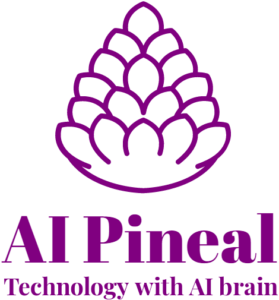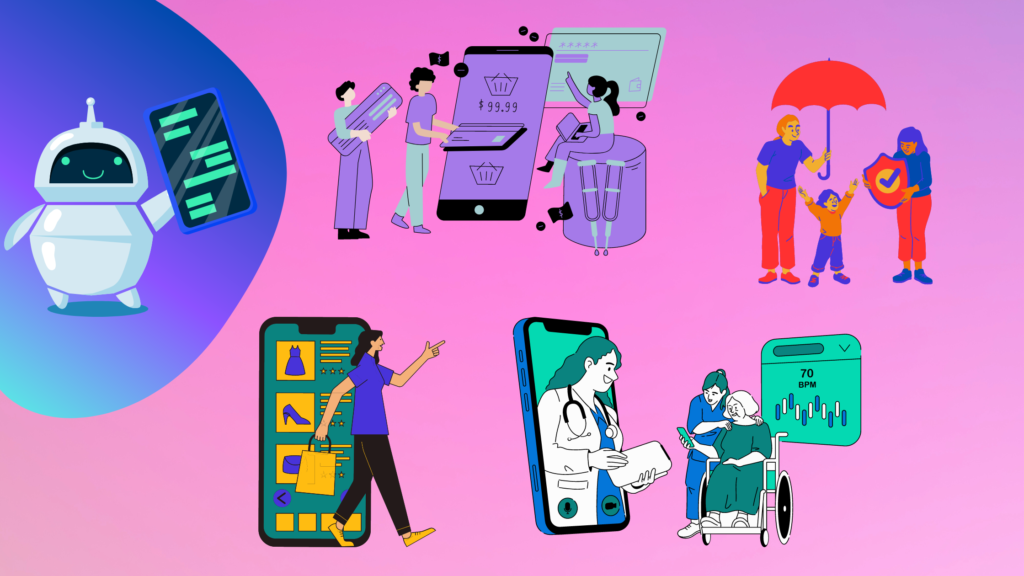Will Make You Discover Powerful AI Bots Use Cases In E-commerce, Insurance, Healthcare, Retail
In this part 1 of the 4-blog series, we will go through the AI bots use cases in the domain of E-commerce, Insurance, Healthcare, and Retail. So, let’s get quickly started.
AI chatbots have demonstrated their potential as game changers in different fields, offering benefits such as:
- faster response times,
- personalized contact,
- enhanced client service,
- affordable alternatives, and
- increased efficiency.
For example, chatbots in the retail industry make personalized recommendations, process orders, and address problems faced by customers, improving the entire consumer experience.
AI bots are utilized in hospitals to triage patients, offer medical guidance, and track their health state.
Furthermore, in the finance industry, AI chatbots play an important role as they enhance automation, lowering costs, and improve fraud detection.
In general, AI chatbots have become known as useful tools across several sectors, allowing businesses to expedite operations, improve client satisfaction, and optimize overall performance.
Table of contents:
Highlights:
- AI bots in E-commerce are used for:
- Customer service and personalized product recommendations
- Making the purchasing process easier
- Automating monitoring of orders and delivery notifications
- AI bots in Insurance are used for:
- Helping consumers with policy questions and claims
- Increasing the efficiency of the application and underwriting processes
- Providing fast quotes and coverage details
- AI bots in Healthcare are used for:
- Patient triage and symptom evaluation with virtual healthcare assistants
- Appointment reminders and medicine reminders
- Personalized wellness suggestions and health monitoring
- AI bots in Retail are used for:
- Helping clients with product questions and recommendations
- Dealing with consumer complaints and refunds
- Personalized advertising and virtual shopping assistants
1. AI bots use cases in E-commerce
AI chatbots have transformed the online buying experience in the realm of e-commerce.
Customer service and personalized product recommendations
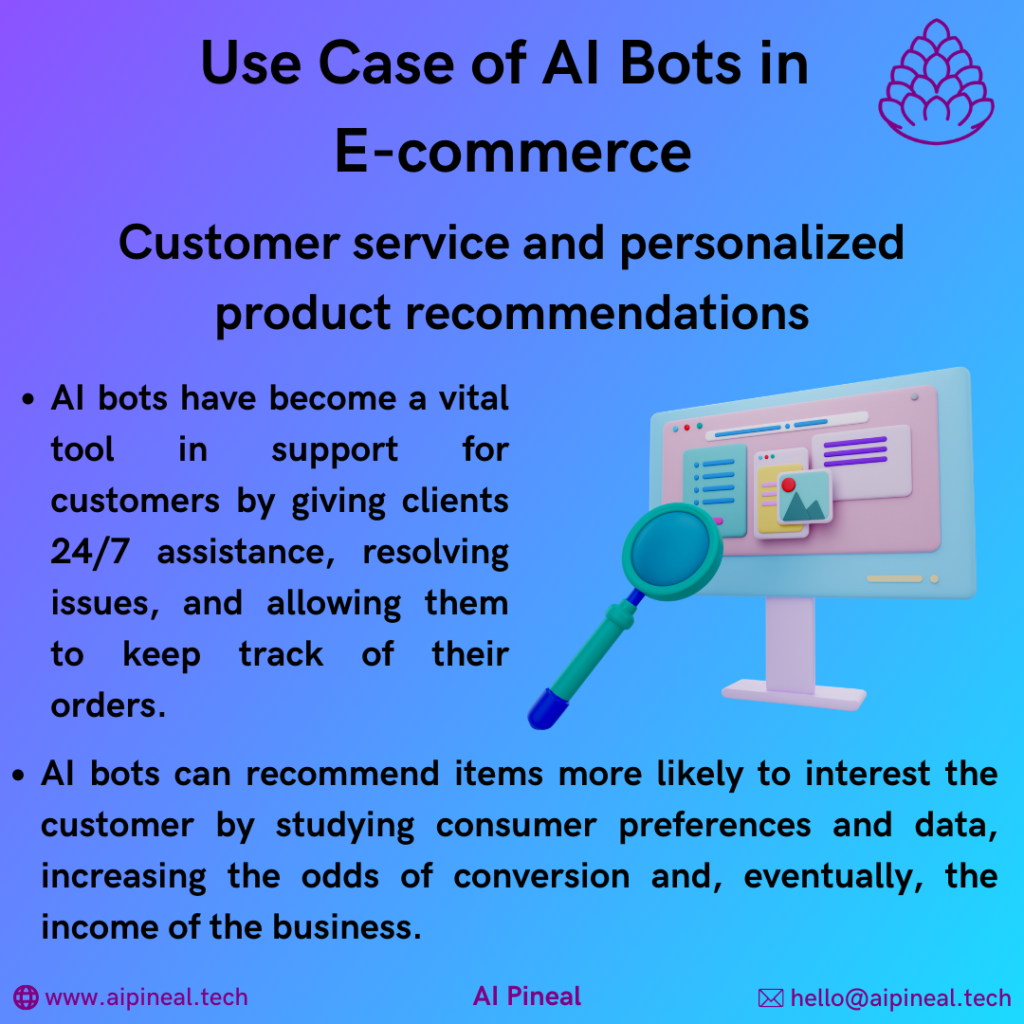
One of the most important advantages of Artificial Intelligence(AI) chatbots in e-commerce is the ability to provide customized product suggestions based on user exploration and previous purchases.
AI bots can recommend items more likely to interest the customer by studying consumer preferences and data, increasing the odds of conversion and, eventually, the income of the business.
Furthermore, chatbots have become a vital tool in support for customers by giving clients 24/7 assistance, resolving issues, and allowing them to keep track of their orders.
Chatbots can also reach out to clients in advance to inform them of promotions, offers, and new products.
Overall, AI chatbots have changed the way e-commerce enterprises interact with customers by giving tailored recommendations and excellent customer service, ultimately boosting revenue and sales growth.
Making the purchasing process easier
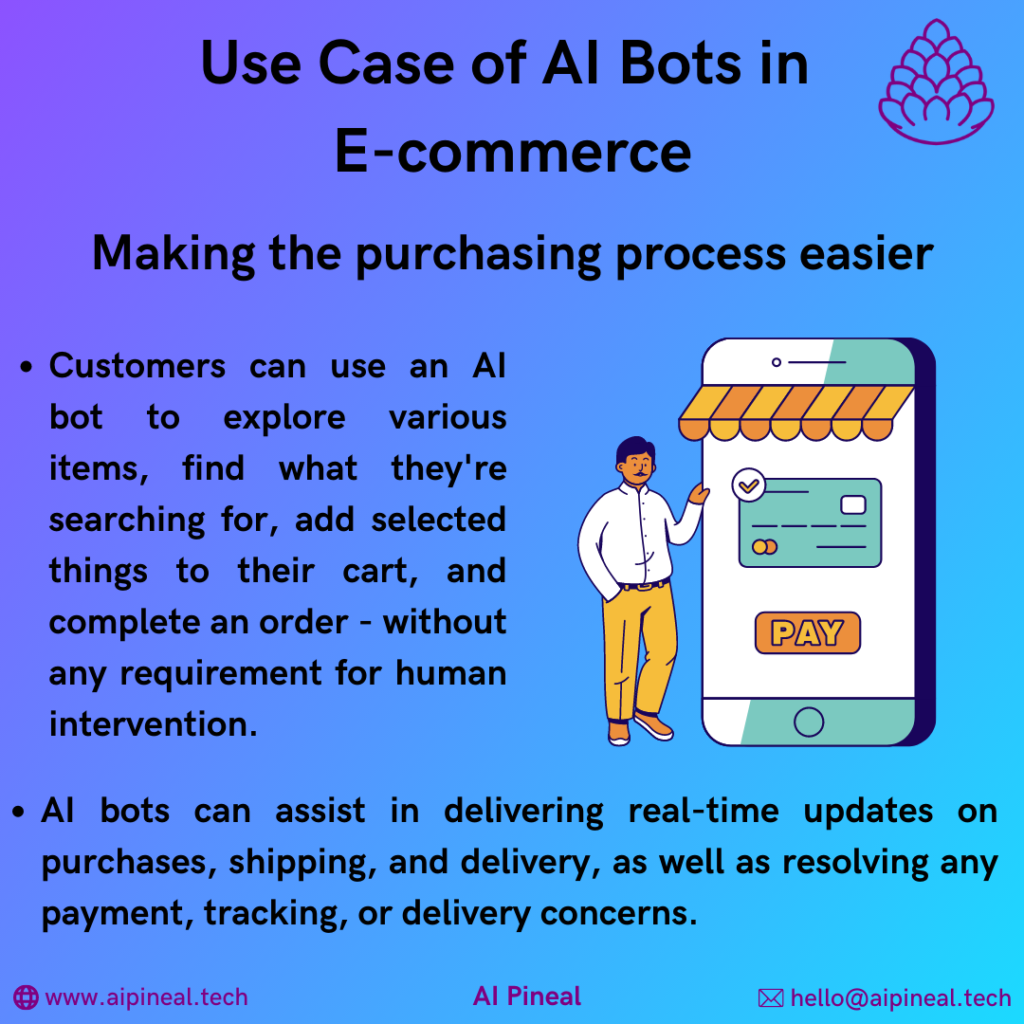
AI chatbots have had an enormous effect on e-commerce businesses by making the shopping process easier for customers.
A significant benefit of chatbots is the ease that they provide to online buyers by streamlining the ordering process. Customers can use a chatbot to explore various items, find what they’re searching for, add selected things to their cart, and complete an order – without any requirement for human intervention.
Furthermore, chatbots can assist in delivering real-time updates on purchases, shipping, and delivery, as well as resolving any payment, tracking, or delivery concerns.
Chatbots create a seamless and pleasurable experience for customers creating loyalty and ultimately generating sales for online businesses by automating the purchasing process.
Automating monitoring of orders and delivery notifications
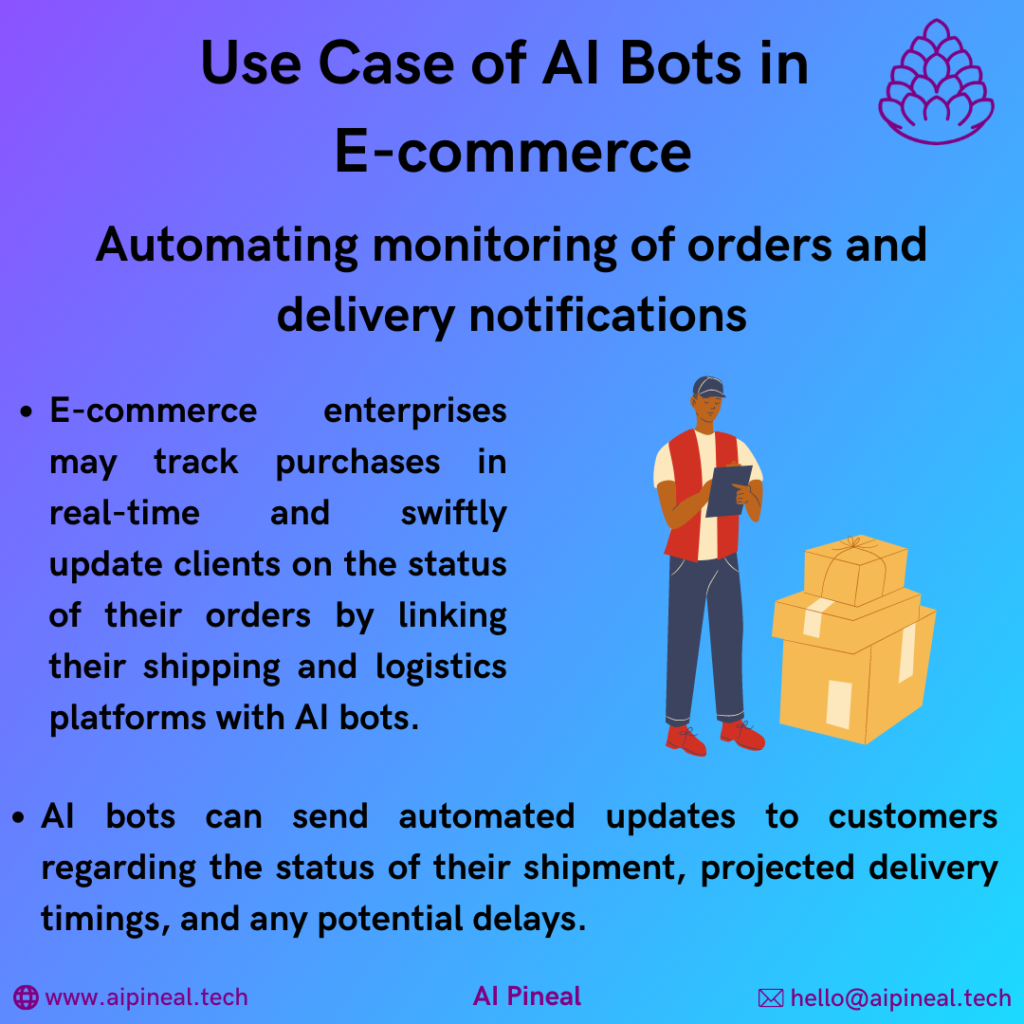
AI chatbots are used by e-commerce companies to automate order tracking and provide prompt updates to their clients.
E-commerce enterprises may track purchases in real time and swiftly update clients on the status of their orders by linking their shipping and logistics platforms with chatbots.
Chatbots can send automated updates to customers regarding the status of their shipment, projected delivery timings, and any potential delays.
Chatbots can also assist in the resolution of issues such as lost or damaged shipments, as well as give clients tracking information or delivery confirmations by text messaging, email, or via social media.
Finally, chatbots relieve customer care workers of the task of managing orders by providing customers with rapid and effective notifications on their orders, enhancing the shopping experience as a whole and raising the possibility of repeat business.
2. AI bots use cases in Insurance
AI chatbots are emerging as a strong tool in the insurance sector, assisting insurers in meeting the ever-increasing needs of their consumers.
Helping consumers with policy questions and claims
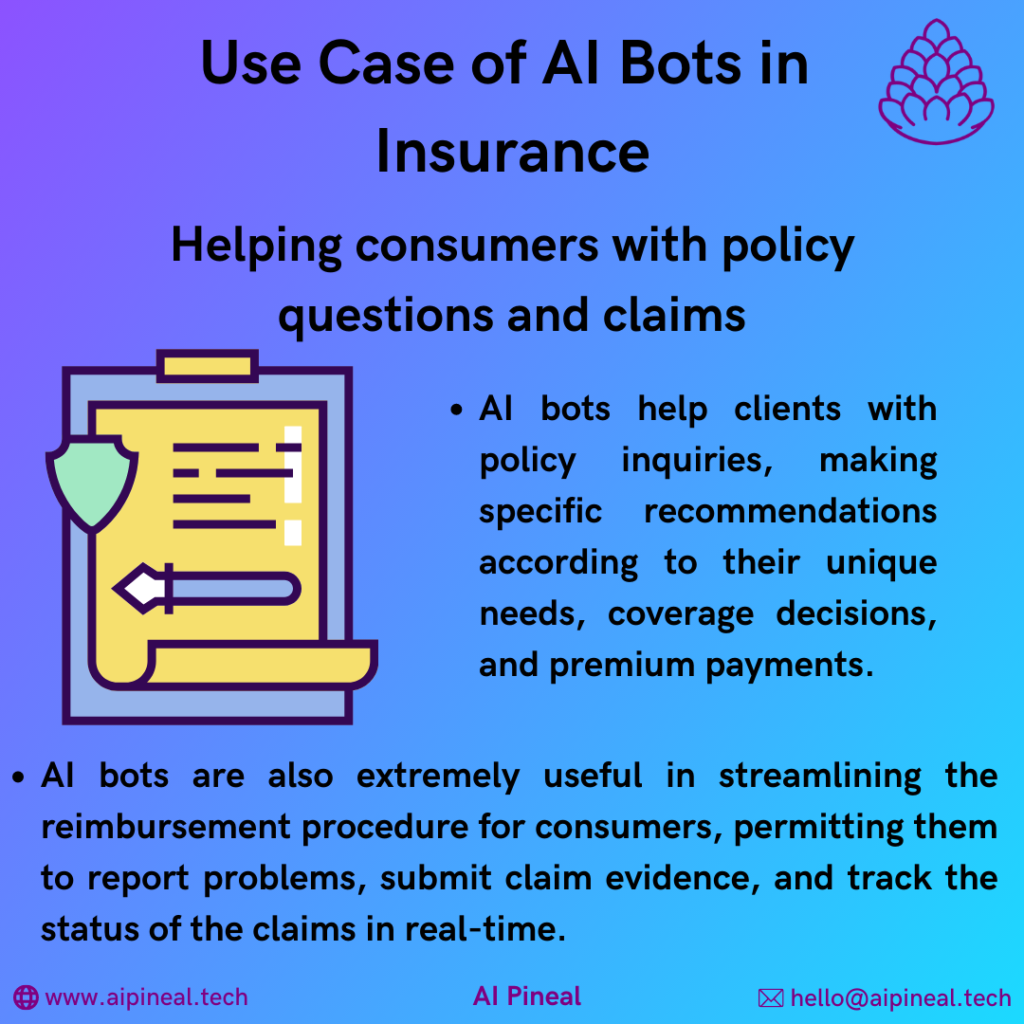
Chatbots help clients with policy inquiries, making specific recommendations according to their unique needs, coverage decisions, and premium payments.
Chatbots are also extremely useful in streamlining the reimbursement procedure for consumers, permitting them to report problems, submit claim evidence, and track the status of the claims in real time.
Chatbots can assist insurers in automating and expediting back-end procedures such as detecting fraud, underwriting, and processing claims.
Overall, the usage of AI chatbots is altering the insurance sector, allowing organizations to provide a more effective and efficient solution while saving up time for representatives to focus on more complex duties, thereby enhancing their overall efficiency.
Increasing the efficiency of the application and underwriting processes
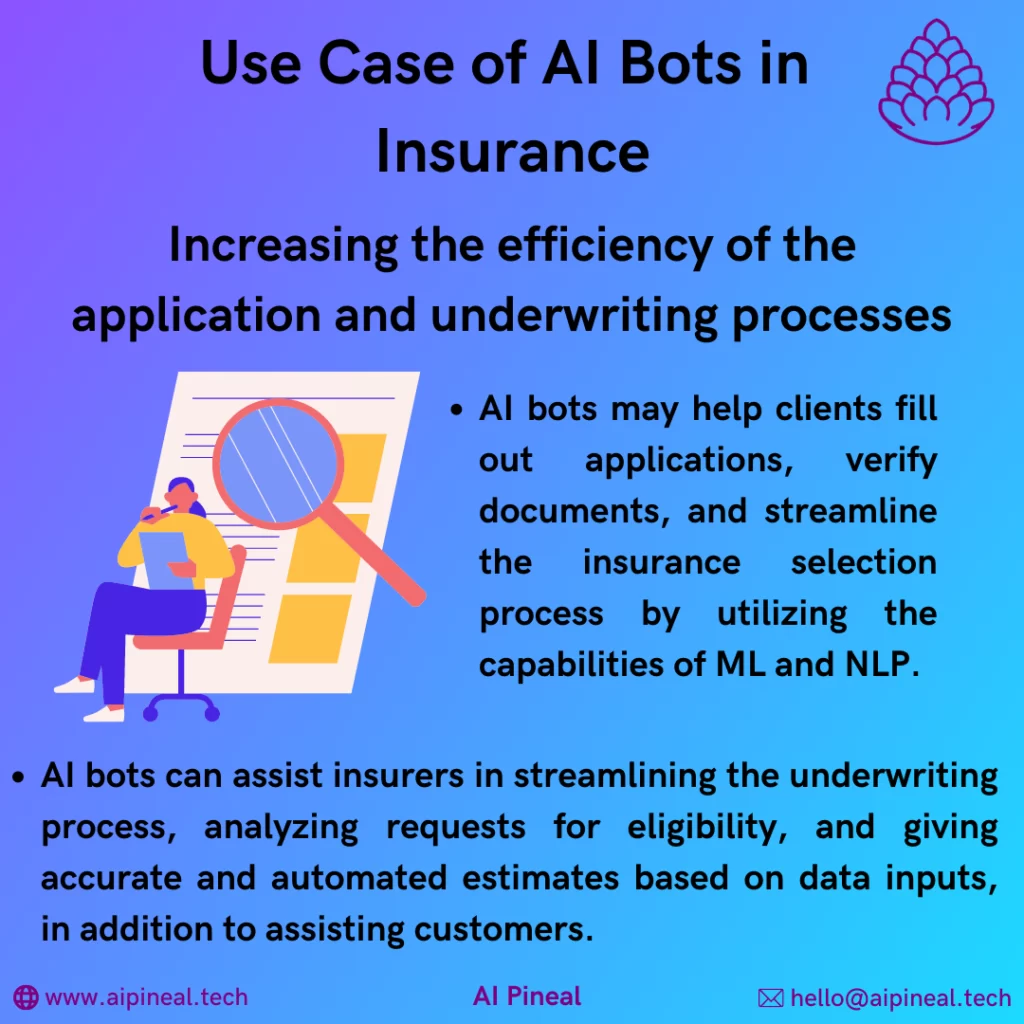
The application and assessment procedure in the insurance sector can be difficult and time-consuming for insurers and clients. However, thanks to AI chatbots, the process has been greatly expedited.
Chatbots may help clients fill out applications, verify documents, and streamline the insurance selection process by utilizing the capabilities of Machine Learning (ML) and Natural Language Processing (NLP).
Chatbots can assist insurers in streamlining the underwriting process, analyzing requests for eligibility, and giving accurate and automated estimates based on data inputs, in addition to assisting customers.
Chatbots can improve the application for insurance and underwriting processes, boosting efficiency, eliminating errors, and resulting in a more pleasant consumer experience.
Providing fast quotes and coverage details
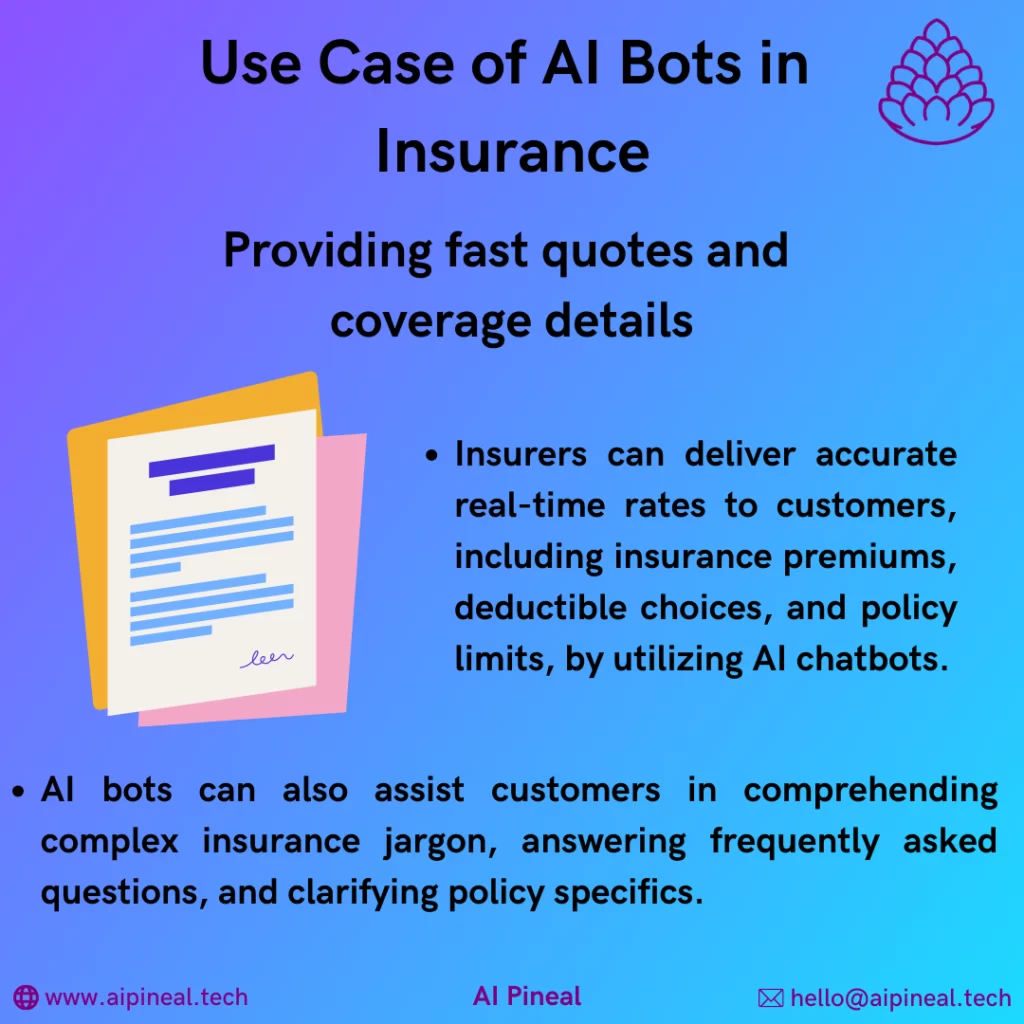
AI chatbots offer customers rapid prices and coverage details. Insurers can deliver accurate real-time rates to customers, including insurance premiums, deductible choices, and policy limits, by utilizing AI chatbots.
Chatbots can also assist customers in comprehending complex insurance jargon, answering frequently asked questions, and clarifying policy specifics. These services are provided 24 hours a day, seven days a week, increasing client satisfaction and decreasing wait times.
Chatbots also assist insurers in automating their outreach efforts by offers and personalized advertisements to customers based on their demographic information or browsing habits.
Chatbots make the insurance application process more convenient, clear, and accessible to customers by delivering fast prices and coverage details.
3. AI bots use cases in Healthcare
The use of AI chatbots for medical purposes has risen dramatically in recent years providing some crucial use cases.
Patient triage and symptom evaluation with virtual healthcare assistants
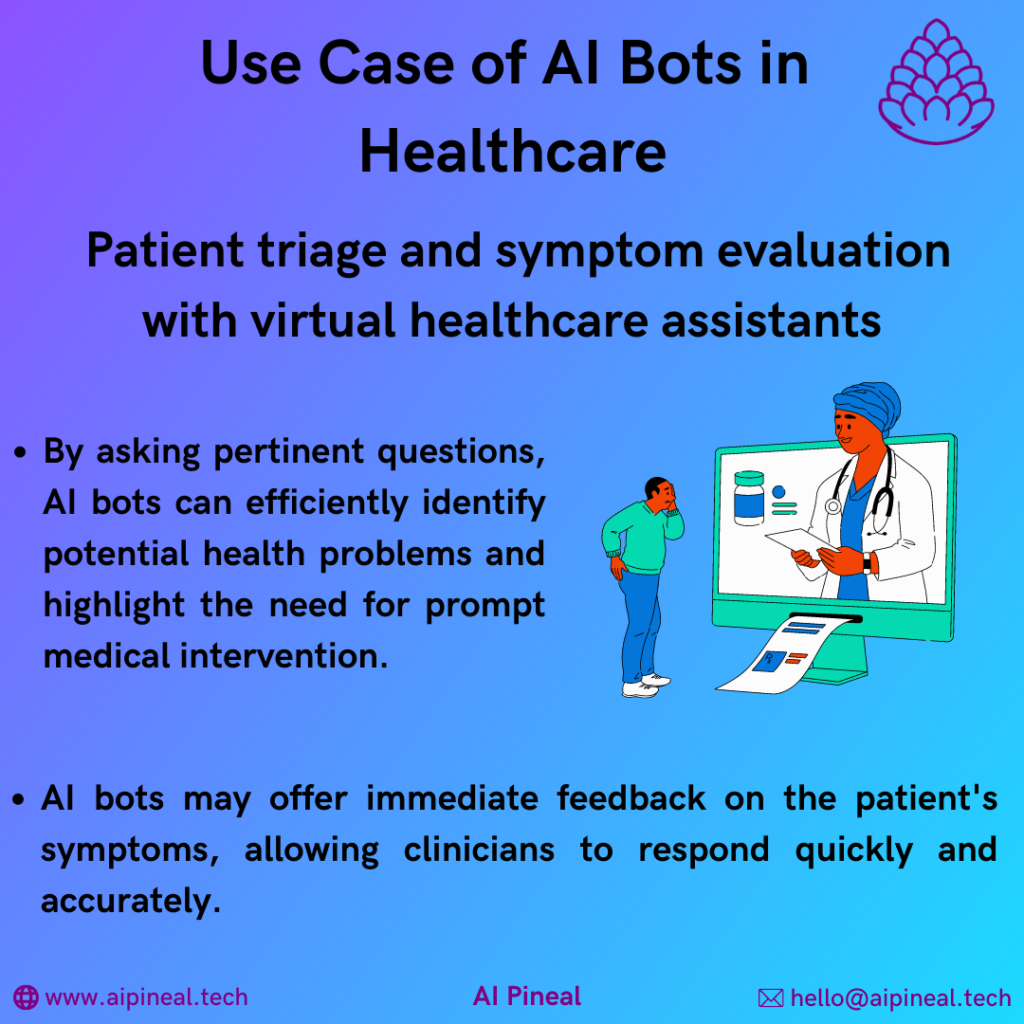
AI bots are increasingly being used as virtual healthcare companions. Patient triage and symptom analysis are two of the most important tasks fulfilled by chatbots in the medical sector.
By asking pertinent questions, chatbots can efficiently identify potential health problems and highlight the need for prompt medical intervention.
Furthermore, chatbots may offer immediate feedback on the patient’s symptoms, allowing clinicians to respond quickly and accurately.
Chatbots can also advise patients on drug management, notify them of upcoming appointments, and address other healthcare-related questions.
Chatbots in healthcare can give economical and precise medical support to patients, promote patient engagement, and allow medical facilities to provide excellent treatment to a larger patient population by leveraging AI technology.
Appointment reminders and medicine reminders
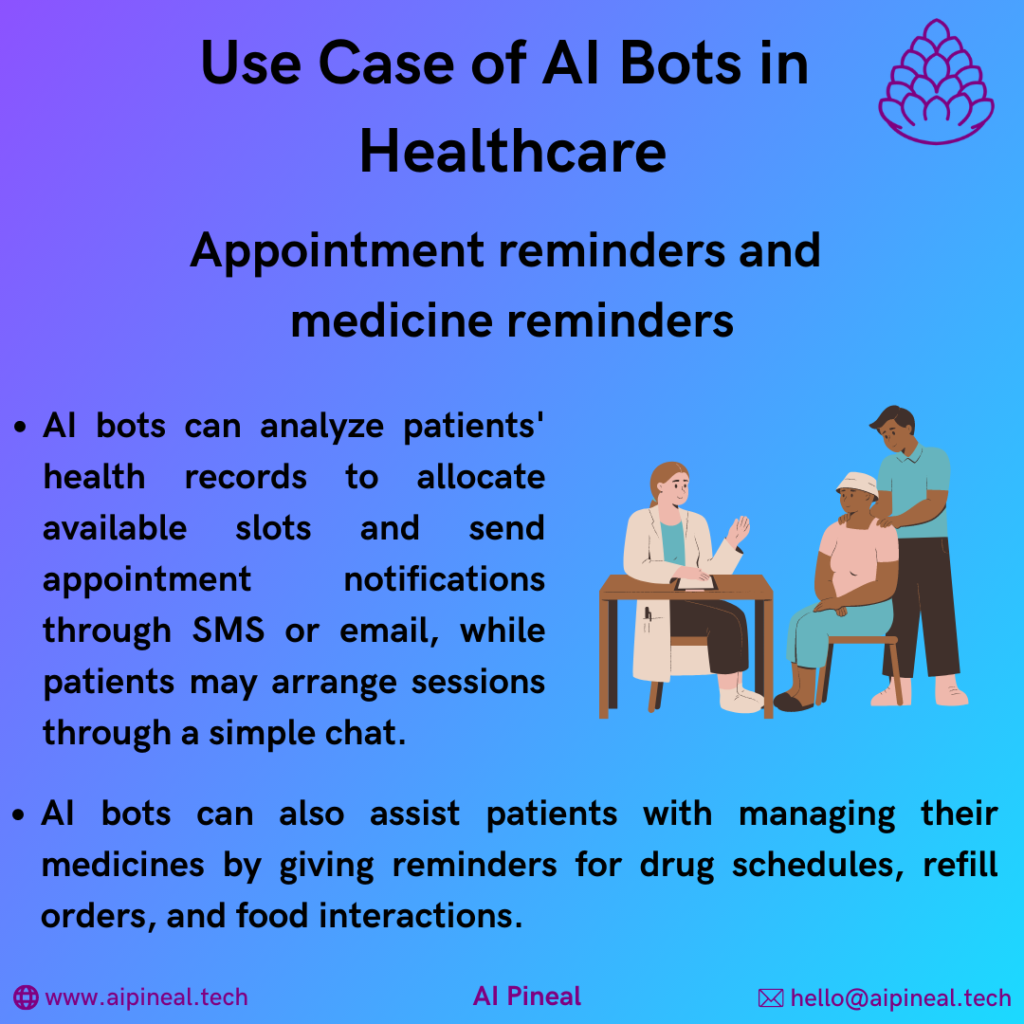
AI chatbots are used for appointment booking and prescription reminders. Chatbots make it easier for patients to plan appointments by removing the necessity to call their physician.
Chatbots can analyze patients’ health records to allocate available slots and send appointment notifications through SMS or email, while patients may arrange sessions through a simple chat.
Chatbots can also assist patients with managing their medicines by giving reminders for drug schedules, refill orders, and food interactions.
Chatbots can answer inquiries regarding medication, dosage, and potential side effects based on histories or treatment databases by using algorithms that analyze natural language to evaluate patients’ responses.
Patients may remain on top of their healthcare demands with more convenience than ever before because of the utilization of AI chatbots in healthcare, enhancing general engagement and patient happiness.
Personalized wellness suggestions and health monitoring
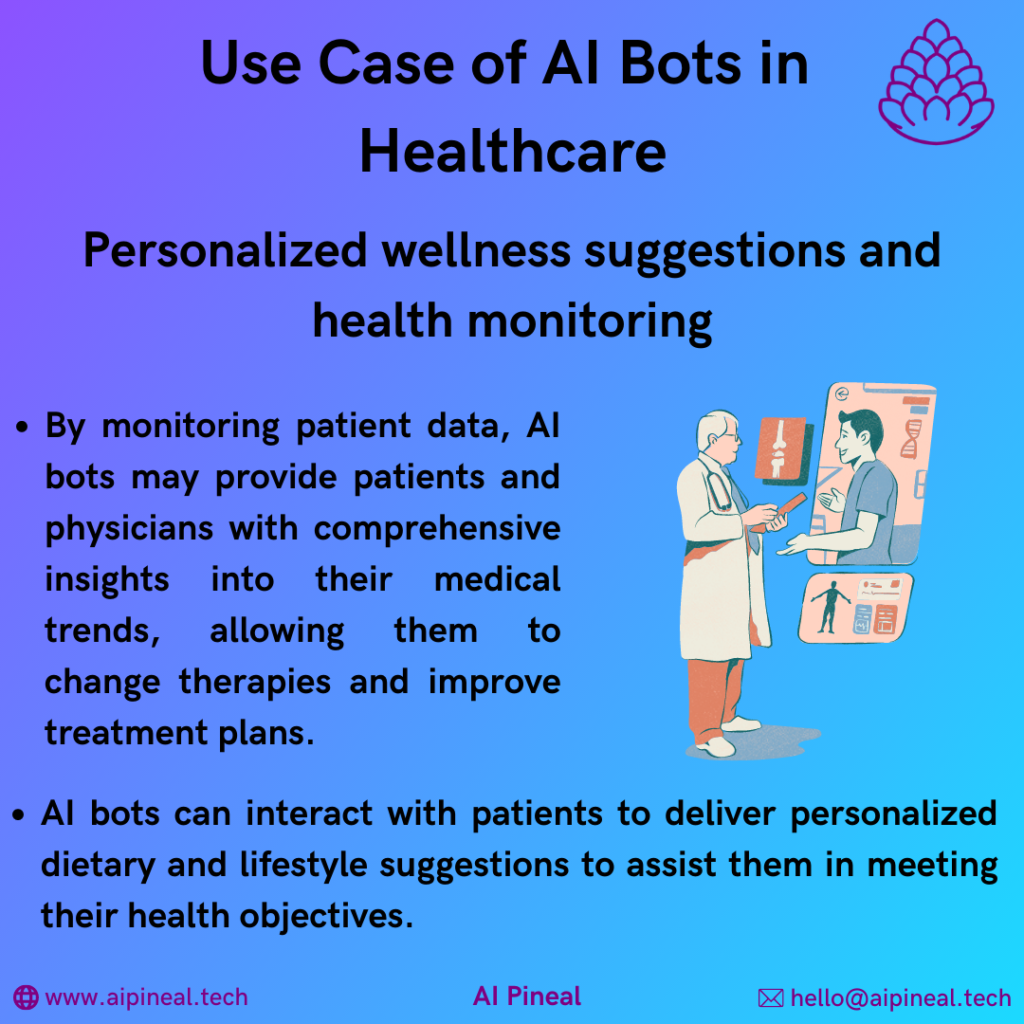
AI chatbots are revolutionizing the monitoring of health and wellness suggestions in healthcare. Chatbots are more cost-effective than medical professionals in monitoring patient data and providing customized health and wellness advice.
This includes monitoring the patient’s activity level, heart rate, blood pressure, and other parameters. With the data gathered, chatbots may provide patients and physicians with comprehensive insights into their medical trends, allowing them to change therapies and improve treatment plans.
Furthermore, chatbots can interact with patients to deliver personalized dietary and lifestyle suggestions to assist them in meeting their health objectives.
Chatbots play an important role in allowing patients to stay fit, healthy, and proactively involved with their treatments as the healthcare sector shifts toward value-based care.
4. AI bots use cases in Retail
AI chatbots have become a vital element of the retail sector’s armory, allowing businesses to communicate with customers more efficiently and improve their shopping experience.
Helping clients with product questions and recommendations
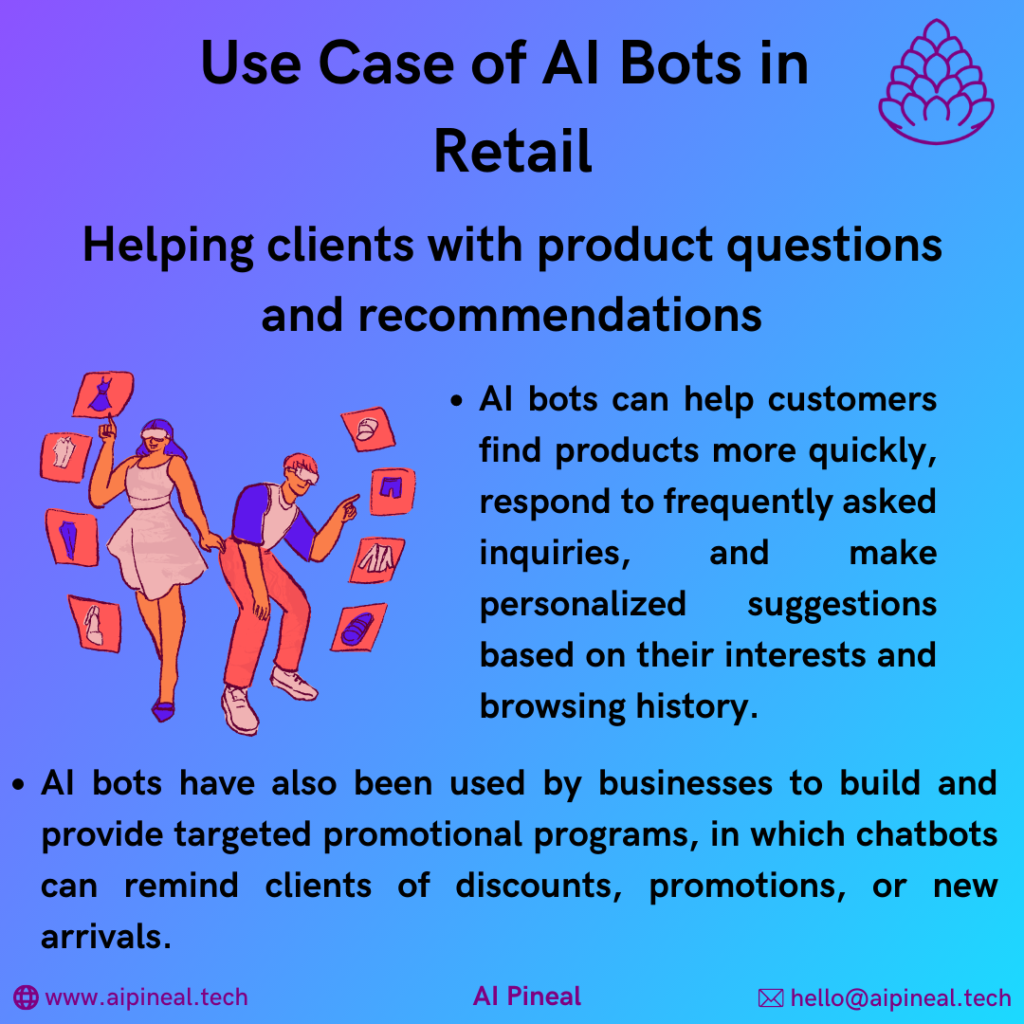
Chatbots can help customers find products more quickly, respond to frequently asked inquiries, and make personalized suggestions based on their interests and browsing history.
Chatbots have also been used by businesses to build and provide targeted promotional programs, in which chatbots can remind clients of discounts, promotions, or new arrivals.
AI chatbots in retail are extremely smart, capable of understanding conversational input and optimizing opportunities for sales, retention rates, and consumer loyalty.
As retail increasingly shifts to online and multichannel forms, AI chatbots are a wise investment to keep clients engaged at scale, enhance productivity, and improve profitability across the sales process.
Dealing with consumer complaints and refunds
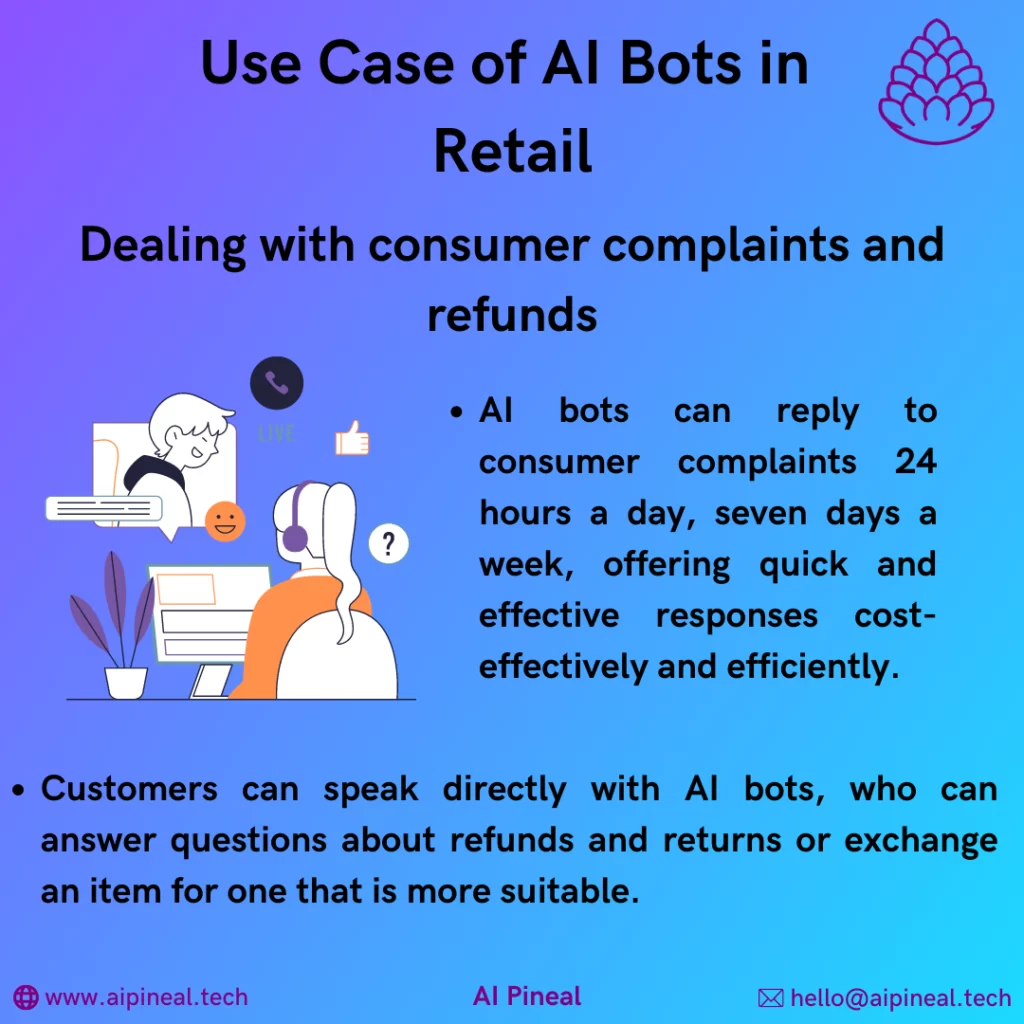
AI chatbots are becoming more prevalent in retail to handle consumer complaints and returns, optimizing the overall customer support experience.
Chatbots can reply to consumer complaints 24 hours a day, seven days a week, offering quick and effective responses cost-effectively and efficiently.
Customers can speak directly with chatbots, who can answer questions about refunds and returns or exchange an item for one that is more suitable.
AI chatbots can also help firms process returns, track the current state of requests, and improve overall productivity.
Chatbots learn from previous client encounters, allowing them to give accurate answers and more effective remedies in the future.
Personalized advertising and virtual shopping assistants
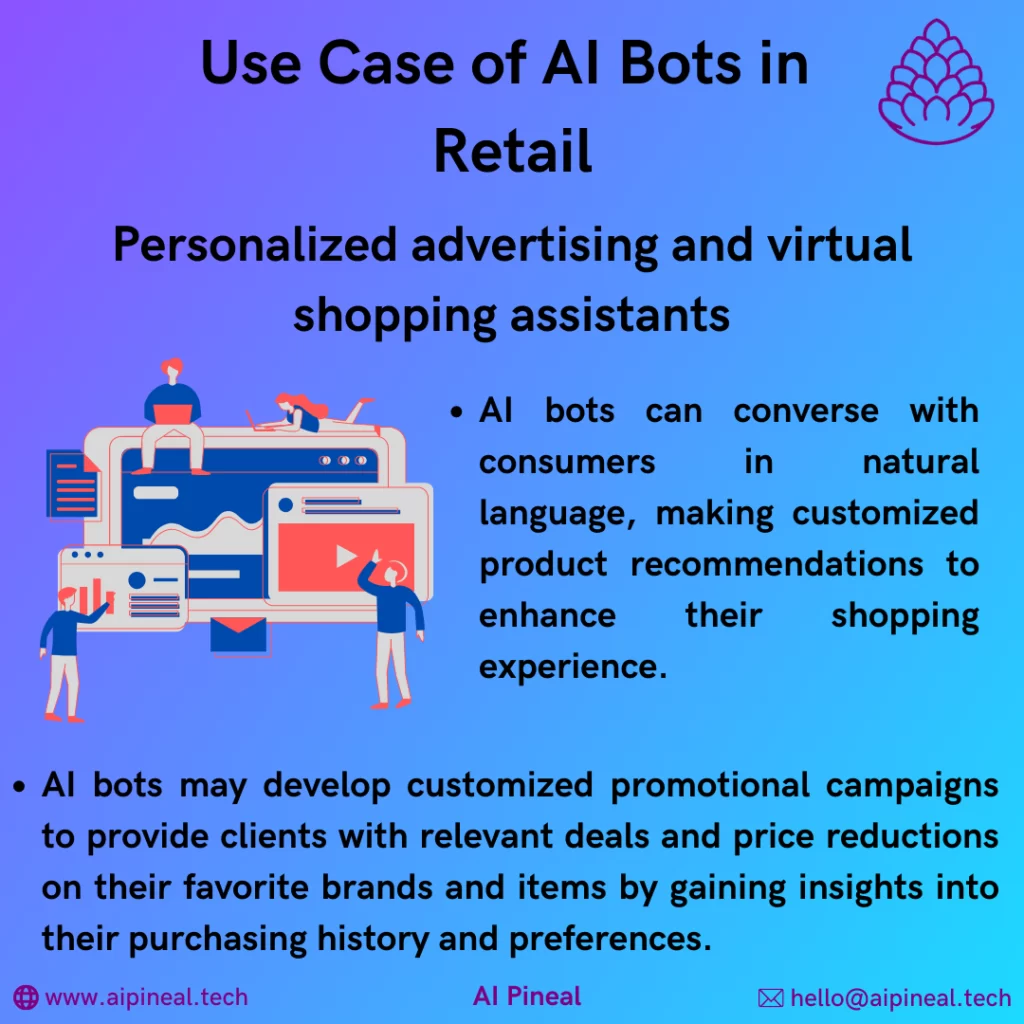
AI chatbots serving as virtual shopping advisors have altered the purchasing experience for customers.
Chatbots can converse with consumers in natural language, making customized product recommendations and ideas to enhance their shopping experience. These chatbots may provide customers with detailed product information, pricing comparisons, and stock availability across cities and locations.
Chatbots may develop customized promotional campaigns to provide clients with relevant deals and price reductions on their favorite brands and items by gaining insights into their purchasing history and preferences.
Customers can even place orders directly with the chatbot, bypassing the need to use a browser or in-store POS.
Chatbots assist merchants in increasing consumer engagement, revenues, and loyalty by providing tailored purchasing experiences that make clients feel appreciated and valued by the brand.
Subscribe to our newsletter
